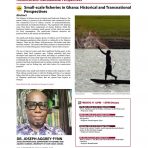Shannon Lecture #2: Small-Scale Fisheries in Ghana: Historical and Transnational with Prof. Joseph Aggrey-Fynn
Shannon Lecture #2: Small-Scale Fisheries in Ghana: Historical and Transnational with Prof. Joseph Aggrey-Fynn
Categories: General, Lectures and Seminars, Virtual | Intended for Anyone

Location Details
Please register to receive the zoom link.
Contact Information
History Department, 613-520-2828, history@carleton.ca
Registration
Cost
Free
About this Event
Host Organization: History Department
More Information: Please click here for additional details.
Friday, June 10th, 2022 from 12:00 p.m. – 1:00 p.m.
Abstract:
The fisheries in Ghana consist of marine and freshwater fisheries. The marine fishery is practice at the subsistence and commercial levels. The commercial level of fishery consists of artisanal/traditional, semi–industrial and industrial fisheries. The significant fish landings come from these three components of marine fisheries whilst the freshwater fishery contribute small amount of fish which are mainly for local consumption. The small–scale fisheries therefore are practiced both in the marine and freshwater.
The small–scale fishery employs about 2.5 million out of 30 million of the Ghanaian population either directly or indirectly in the fisheries industry. These are the fishers, fish processors, fish traders and other auxiliary workers. The small–scale fishery industry is characterized by the use of several fishing gears which targets various fish resources.
The use of dug–out canoes and other traditional fishing gears in the industry dates back centuries ago. Fishing materials had been developed and improved from cotton and hemp to synthetic fibres, mechanization of canoes had improved from hand driven to gasoline even though the use of oars is still practice. However, some historical practices had been maintained such as salting, smoking, drying of fish for storage; and no fishing day and other taboos for conservation purposes.
Historically, some small–scale fishers in Ghana either migrate to other West African coastal states to settle for fishing activities or as migrant fishers that fish in other waters and return to Ghana. There are records of Ghanaian small–scale fishers that are spread from Angola to Senegal.
Speaker’s Bio:
Prof. Joseph Aggrey-Fynn is an Associate Professor of Fisheries and Aquatic Sciences in the University of Cape Coast. He has developed his career in Ghana and Germany and has experience in the research and teaching of fisheries and aquatic sciences since 2002. His research interests cover the following areas: (i) Marine microplastics in fish stomach contents, (ii) Fish stock assessment in the western Gulf of Guinea, (iii) Otolithic studies of marine fish species, (iv) Marine capture fisheries and offshore oil and gas operations, (v) Environmental monitoring in the offshore oil and gas fields in Ghana, and (vi) Occurrence of heavy metals in fish visceral organs in small-scale mining areas. Prof. Aggrey-Fynn had participated in a number of multi-national offshore cruises for oceanographic and fisheries data collection and research in the western Gulf of Guinea as a scientist in 2005, 2009, 2010 and 2012. He was the Founding Director of the Institute for Oil and Gas Studies in the University of Cape Coast from 2013-2018 and had served as a member on the National Steering/Implementation Committees on National Fisheries College (2011-2019); and West Africa Regional Fisheries Program (WARFP) (2012-2016).